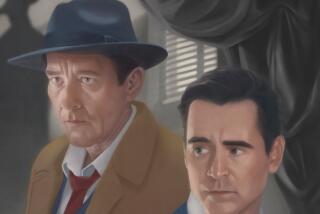Victorian secrets
- Share via
In “Long Spoon Lane,” the prolific writer Anne Perry has once again delivered the tasty concoction her readers have come to expect, a novel of crime and manners embedded in a pudding of Victorian England.
“Long Spoon Lane” -- one needs a very long spoon indeed to dine with the devil -- is the latest of 24 novels in Perry’s series featuring sleuth Thomas Pitt and his wife, Charlotte. An additional 14 novels, set in the same period, star Inspector William Monk. Perry also has written two novels about World War I and two more set at Christmas.
In “Long Spoon Lane,” the scenery is Victorian -- in the year 1893 -- but the dilemma presented is contemporary. Anarchists are afoot in London. A powerful bomb destroys three houses in the humble East End. There is loud talk in Parliament of strong countermeasures: of giving guns, of all things, to the police and of letting constables interview servants without the permission of their masters and mistresses.
In Perry’s novel, the decent characters, from the titled to the commoner, want to prevent this egregious assault on the ancient liberties of Englishmen and stop the anti-crime bill that would greatly expand police powers. But with public fear and outrage at a high pitch, the flames fanned by newspapers, how can the legislation be stopped?
Perry introduces the theme of police corruption, and from this point the novel turns on the idea of evil versus common decency. It does not give away too much to say that the side the reader is rooting for wins in the end but not without some deaths and much heartache.
Perry has a stylistic quirk that is unusual for a writer of crime stories and thrillers; it may please some readers and put others off. When one of her characters faces a decision, she stops action, as it were, to analyze what the character’s choices are and how he or she is weighing them. This device has the effect of halting the forward movement of the novel.
Nonetheless, the plot of “Long Spoon Lane” is neatly put together and works out like a clever contraption with no loose ends.
The setting is evocative: teeming London, one of the largest and most cosmopolitan cities in the world, through the heart of which winds, as in Dickens’ “Our Mutual Friend,” the River Thames, almost alive, itself a character in a novel of mystery and secrets.
Perry’s social world is very much one of masters and servants, who naturally speak vastly different versions of the English language. Fortunately for American readers, her rendition of working-class speech can be read without difficulty.
In “Long Spoon Lane,” Perry takes us on an agreeable jaunt through a time not so distant after all and presents us with moral and political puzzles that are all too close to our own. *
More to Read
Sign up for our Book Club newsletter
Get the latest news, events and more from the Los Angeles Times Book Club, and help us get L.A. reading and talking.
You may occasionally receive promotional content from the Los Angeles Times.









